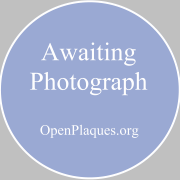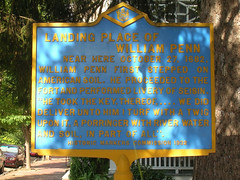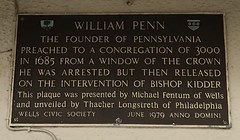

William Penn
(1644-1718)
Died aged 73
Wikidata WikipediaWilliam Penn (24 October [O.S. 14 October] 1644 – 10 August [O.S. 30 July 1718] 1718) was an English writer and religious thinker belonging to the Religious Society of Friends (Quakers), and founder of the Province of Pennsylvania, a North American colony of England. He was an early advocate of democracy and religious freedom, notable for his good relations and successful treaties with the Lenape Native Americans. In 1681, King Charles II handed over a large piece of his North American land holdings along the North Atlantic Ocean coast to Penn to pay the debts the king had owed to Penn's father, the admiral and politician Sir William Penn. This land included the present-day states of Pennsylvania and Delaware. Penn immediately set sail and took his first step on American soil, sailing up the Delaware Bay and Delaware River, past earlier Swedish and Dutch riverfront colonies, in New Castle (now in Delaware) in 1682. On this occasion, the colonists pledged allegiance to Penn as their new proprietor, and the first Pennsylvania General Assembly was held. Afterward, Penn journeyed further north up the Delaware River and founded Philadelphia, on the west bank. However, Penn's Quaker government was not viewed favorably by the previous Dutch and Swedish colonists, and earlier English settlers in what is now Delaware, but claimed for half a century by the neighboring Province of Maryland's proprietor family, the Calverts and Lord Baltimore. These earlier colonists had no historical allegiance to a "Pennsylvania", so they almost immediately began petitioning for their own representative assembly. Twenty-three years later in 1704, they achieved their goal when the three southernmost counties of provincial Pennsylvania along the western coast of the Delaware were permitted to split off and become the new semi-autonomous colony of Lower Delaware. As the most prominent, prosperous and influential settlement in the new colony, New Castle, the original Swedish colony town became the capital. As one of the earlier supporters of colonial unification, Penn wrote and urged for a union of all the English colonies in what was to become the United States of America. The democratic principles that he included in the West Jersey Concessions, and set forth in the Pennsylvania Frame of Government served as an inspiration for the members of the convention framing the new U.S. Constitution in Philadelphia in 1787. As a pacifist Quaker, Penn considered the problems of war and peace deeply. He developed a forward-looking project and thoughts for a United States of Europe through the creation of a European Assembly made of deputies who could discuss and adjudicate controversies peacefully. He is therefore considered the first thinker to suggest the creation of a European Parliament and what would become the modern European Union in the late 20th century. A man of deep religious convictions, Penn wrote numerous works in which he exhorted believers to adhere to the spirit of Primitive Christianity. He was imprisoned several times in the Tower of London due to his faith, and his book No Cross, No Crown (1669), which he wrote while in prison, has become a Christian classic of theological literature.
DbPedia
Family tree
Commemorated on 14 plaques
Quaker and Founder of Pennsylvania William Penn (1644 - 1718) With other Friends he established this meeting house.
Blue Idol Quaker Meeting House, Coolham, United Kingdom where they established
Here William Penn (1644-1718) Quaker Statesman and Man of Vision, Founder of Pennsylvania and Planner of Philadelphia, Friend of the Indians, Crusader for Civil and Religious Liberty, Designer of European Peace, resided for five years after his marriage to Gulielma Maria Springett (1644-1694) The stone above this tablet from Pennsbury, Pennsylvania, the ancient home of William Penn on the Delaware River, was presented by the Pennsylvania Historical and Museum Commission who are the custodians of the property.
Basing House, 46 High Street, WD3 1HP, Rickmansworth, United Kingdom where they lived
William Penn, Quaker born on Tower Hill baptised in All Hallows Church 23rd Oct 1644 founder of Pennsylvania
All Hallows-by-the-Tower Church, Byward Street, London, United Kingdom where they was baptised
William Penn (founder of Pennsylvania) worshipped here
RISC Global Cafe, London Street, Reading, United Kingdom where they worshipped
Near this site William Penn and William Mead were tried in 1670 for preaching to an unlawful assembly in Grace Church Street. This tablet commemorates the courage and endurance of the jury, Thos Vere, Edward Bushell and ten others who refused to give a verdict against them although locked up without food for two nights and were fined for their final verdict of not guilty. The case of these jurymen was reviewed on a Writ of Habeas Corpus and Chief Justice Vaughan delivered the opinion of the Court which established"The Right of Juries" to give their verdict according to their convictions.
Gracechurch Street, London, United Kingdom where they tried
Landing Place of William Penn Near here October 27, 1682, William Penn first stepped on American soil. He proceeded to the fort and performed Livery of Seisin. "He took the key, thereof,.... We did deliver unto him 1 turf with a twig upon it, a porringer with river water and soil, in part of all".
?, New Castle, DE, United States where they first stepped on American soil (1682)
Bucks County. One of Pennsylvania's three original counties. Formed 1682 by William Penn and site of his home, Pennsbury Manor. Name is derived from abbreviation for Buckinghamshire in England. Doylestown, chosen as county seat in 1812, was incorporated 1838.
Courthouse, E. Court St., Doylestown, PA, United States where they was
Pennsbury. William Penn's country home in Pennsylvania, built 1683-1700.
At site, Tullytown, PA, United States where they lived
William Penn's First Walking Purchase. This site, Towissinck or Jerricho Creek, was the northern boundary of Penn's 1st purchase of Native American land on July 15, 1682. The land purchase was measured by the distance a man could walk in a day and a half, starting from the mouth of the Neshaminy Creek. It is believed Penn walked the distance himself, covering what is now Bristol, Falls, Middletown, Newtown, Lower and part of Upper Makefield Twps.
Jericho Creek @ intersection of River & Taylorsville Rds., Washington Crossing, PA, United States where they purchased
Penn Landing. Oct. 29, 1682, soon after finishing a two-months' voyage, William Penn first set foot on his colony of Pennsylvania, granted by Charles II the year before. The site is a block south.
SE corner, 2nd (Pa. 291) & Penn Sts., at end of park, Chester, PA, United States where they was
William Penn (1644-1718) - "Essex House" - PLAQUE. First lodged in America in the "Essex House" on this site October 28, 1682 The guest of Robert Wade. Here the earliest Quaker settler on this side Delaware River, 1676. Purchaser of the property, then called "Printzdorp," from the... (missing)
102 Penn St. at E end of park, on brick wall, Chester, PA, United States where they stayed (1682)
Merion Friends Meeting. Continuously used since its erection in 1695 by Quakers, this Meeting House is thought to have been visited by William Penn. Welsh carpenters are believed responsible for its highly unusual cruciform architecture.
651 Montgomery Ave., Narberth, PA, United States where they was
William Penn - Slate Roof House - PLAQUE. William Penn with his family lived on this site in the slate roof house on his second visit to Pennsylvania 1699-1701 as tenant of Samuel Carpenter. Here in 1699 was born John Penn, called "The American" because he was the only child born to the Founder ... (missing)
135 S. 2nd St.(SE corner 2nd & Sansom), Philadelphia, PA, United States where they was
William Penn The founder of Pennsylvania Preached to a congregation of 3000 in 1685 from a window of The Crown He was arrested but then released on the intervention of Bishop Kidder This plaque was presented by Michael Fentum of Wells and unveiled by Thacher Longstreth of Philadelphia.
Market Place, Wells, United Kingdom where they preached (1685)





